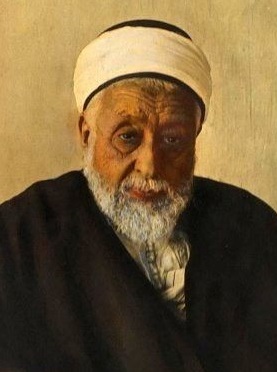Top Qs
Timeline
Chat
Perspective
Abd Al-Rahman Al-Gillani
Prime minister of Iraq from 1920 to 1922 From Wikipedia, the free encyclopedia
Remove ads
Qutb-ul Aqtaab Naqib Al Ashraaf Syed Abd ar-Rahman al-Qadri al-Gillani (Arabic: عبد الرحمن الكيلاني النقيب; 11 January[citation needed] 1841 – 13 June 1927) was the first prime minister of Iraq. He was an important figure during the Ottoman and the British Eras, and he had an important role in the politics of Iraq.
This article needs additional citations for verification. (April 2018) |
Remove ads
Early life
Al-Gillani was born in Baghdad[citation needed] to a Sufi family. Al-Gillani was a descendant of Abdul Qadir al-Gillani. His family has been known since ancient times for its scientific significance and councilmen and was known for his morality and love for his people.[1] He was the captain of the Banu Hashim of the Quraishi tribe in Baghdad. He lived most of his life as an Ottoman and studied under Sultan Abdul Hamid II who strongly supported him on the issue of Palestine when he was young.[2]
Remove ads
Political career
Al-Gillani was chosen in 1920 to head the Iraqi Council of Ministers following the dissolution of the Ottoman Empire. Due to his good relations with the British and his personality, he was one of the candidates for the throne of Iraq. He refused to take the title out of renunciation of the King but agreed to be prime minister. He used his influence to oppose the appointment of Faisal I as King of Iraq and resigned from his post when his efforts were defeated. Nevertheless, Faisal still reappointed him as prime minister in order to curb opposition.[3] Even though Al-Gillani was reinstated, his powers were greatly diminished as the king and the British took more prominent roles in appointing ministers and other government officials. [3]
In 1922, al-Gillani negotiated the first Anglo-Iraqi Treaty, which ensured nominal independence for the country, though Britain maintained control of the military and foreign affairs, essentially establishing a Mandate in the country. Opposed to these results, al-Gillani resigned shortly after and spent the rest of his life in seclusion.[4]
Remove ads
Death and burial
Al-Gillani died on 13 June 1927 in Baghdad, aged 86. His funeral was attended by many high figures of Iraq including Prince Ghazi. He was buried inside the Mausoleum of Abdul-Qadir Gillani shrine near the shrine of Abdul Qadir al-Gillani.[5]
One of his sons was named Syed Mahmood Hussamuddin al-Gillani.
In pop culture
Al-Gillani and his role in the Ottoman Empire was briefly mentioned in the Iraqi television drama Sarah Khatoon, which aired on Al Sharqiya.[6]
See also
References
Wikiwand - on
Seamless Wikipedia browsing. On steroids.
Remove ads

